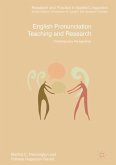This book offers contemporary perspectives on English pronunciation teaching and research in the context of increasing multilingualism and English as an international language. It reviews current theory and practice in pronunciation pedagogy, language learning, language assessment, and technological developments, and presents an expanded view of pronunciation in communication, education, and employment. Its eight chapters provide a comprehensive and up-to-date analysis of pronunciation and the linguistic and social functions it fulfils. Topics include pronunciation in first and second language acquisition; instructional approaches and factors impacting teachers' curriculum decisions; methods for assessing pronunciation; the use of technology for pronunciation teaching, learning, and testing; pronunciation issues of teachers who are second-language speakers; and applications of pronunciation research and pedagogy in L1 literacy and speech therapy, forensic linguistics, and health, workplace, and political communication. The chapters also critically examine the research base supporting specific teaching approaches and identify research gaps in need of further investigation. This rigorous work will provide an invaluable resource for teachers and teacher educators; in addition to researchers in the fields of applied linguistics, phonology and communication.
"The book is written in a clear academic style. ... Any novice or practicing teacher, teacher trainer, course developer, young researcher or experienced researcher who desires information about recent L2 pronunciation research and its application will benefit from this book. ... Given the holistic approach adopted, the book presents a valuable contribution to the field of L2 pronunciation." (Anastazija Kirkova-Naskova, Journal of Second Language Pronunciation, February 25, 2020)








